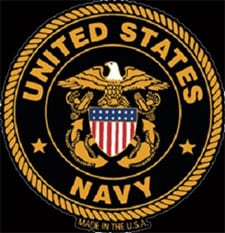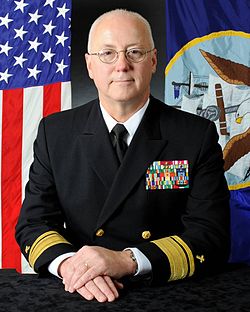Ari Ezra Waldman is a 2002 graduate of Harvard College and a 2005 graduate of Harvard Law School. After practicing in New York for five years and clerking at a federal appellate court in Washington, D.C., Ari is now on the faculty at California Western School of Law in San Diego, California. His research focuses on gay rights and the First Amendment. Ari will be writing weekly posts on law and various LGBT issues.
Follow Ari on Twitter at @ariezrawaldman.
 The American Navy does a lot of outstanding things. It gives us rides when we need to go fight somewhere. It's really good at cleaning things. And it sings jaunty tunes (but the Royal Navy may have us beat there).
The American Navy does a lot of outstanding things. It gives us rides when we need to go fight somewhere. It's really good at cleaning things. And it sings jaunty tunes (but the Royal Navy may have us beat there).
In all seriousness, our sailors are the best seafaring warriors in the world, with a non-motto motto of non sibi sed patriae, or "not self but country."
Ten days ago, the Navy took the rather uninteresting step of allowing Navy chapels to be used for same-sex weddings in states where marriage equality is a reality. Though the policy has been temporarily withdrawn subject to further review, the nascent rule caused an upheaval among the conservative chattering classes not seen since they realized President Obama is black.
"The great American Navy is being forced to submit on it's hands and knees to the radical gay liberal agenda," said one apoplectic commentator in what is either pure fish-out-of-water comedy or a devilish wink to insidious stereotyping. But, if we could dial down the rhetoric for a moment, perhaps we can see that the Navy's all-too-brief olive branch to its gay and lesbian sailors is probably the least interesting thing to come out of "the Repeal." The policy would be no more a violation of the Defense of Marriage Act (DOMA) than eating chicken soup with noodles instead of matzo balls would be a violation of Jewish law.
An analysis of this non-controversy AFTER THE JUMP…
 In an April 13 memo, Rear Admiral Mark Tidd, the chief of chaplains in the Navy, said that weddings in military chapels would be "sexual orientation neutral" in states with marriage equality once Don't Ask, Don't Tell (DADT) ended. Adm. Tidd said that Navy chaplains would not be required to officiate at same-sex marriage ceremonies if it was inconsistent with religious beliefs and that all marriages could occur on base because Navy lawyers had concluded that base facility use has nothing to do with being gay or straight.
In an April 13 memo, Rear Admiral Mark Tidd, the chief of chaplains in the Navy, said that weddings in military chapels would be "sexual orientation neutral" in states with marriage equality once Don't Ask, Don't Tell (DADT) ended. Adm. Tidd said that Navy chaplains would not be required to officiate at same-sex marriage ceremonies if it was inconsistent with religious beliefs and that all marriages could occur on base because Navy lawyers had concluded that base facility use has nothing to do with being gay or straight.
That should clarify the matter. At issue is the use of a building, a piece of government property that has been outfitted to cater to the spiritual needs of, in this case, sailors. There are also federal buildings outfitted to process our tax returns, read patent applications and protect endangered fish. If John Q. Animallover wanted to get married to Jane X. Fishmonger at a branch of the Environmental Protection Agency, the couple could ask John's supervisor for permission and ask a pastor to officiate with John's cubicle in the background. John and Adam Z. Barker should be able to do the same.
By bringing marriage equality into Navy chapels, Adm. Tidd is not suggesting that the federal government now recognizes same sex marriages or will grant any of the rights opposite-sex couples get upon their unions; rather, he is saying that where states allow it, the Navy's buildings are options for where to hold the ceremony. Chaplains need not perform same-sex weddings and they need not lift a finger to help make it happen. The Navy will not give gay couples married in its chapels any special rights different from those gay couples married at the local courthouse. And, that is just a matter of fairness and good business. A friend of mine just paid more than a few thousand dollars to hold her wedding in her old school chapel. Maybe the Navy can get in on the action.
The raucous complaints from the right reek of the same desperation we seen in Congress regarding the Repeal of DADT. Rep. Duncan Hunter (R-CA) has introduced an amendment to expand the certification process required for a final Repeal hoping that a lone hold out among the service chiefs would stop the demise of DADT. He's wasting his ample supply of hot air and resorting to a Hail Mary pass that neither has any hope of passing nor any hope of slowing down Repeal. The service chiefs are on board and our Democratic allies in the Senate are opposed. Even if the amendment does pass, since the service chiefs are the ones on record saying everything is going smoothly with training for Repeal, the extra signatures would be a pointless waste of time.
Still, the federal building analogy is inapt. Not all federal buildings are treated equally, a principle recognized in Adm. Tidd's order when he allowed same-sex marriages to be performed in Naval chapels only in states that allow gays and lesbians to get married. A federal building in Massachusetts could be used for a gay wedding, but one in Alabama could not.
Federal buildings used as places of worship may also be different than any other federal building. Though military chapels and state school churches — the other government-owned buildings used for religious purposes — are usually nondenominational, they are houses of god where people can come to pray, seek counsel and commune with whatever higher power they choose. Perhaps that makes them unique.
It does make them unique, but it does not make them oases of discrimination in a government built on the principles of liberty, equality and service.
Rather, it raises interesting legal questions. Which is more important for determining the public's (in this case, sailors) rights in a Navy chapel? The fact that the federal government owns the building, or the fact that it is a house of worship? An attorney at the American Civil Liberties Union might argue that the use of any federal building for religious purposes violates the Establishment Clause of the First Amendment, suggesting that there could be no military chapels. I decline to go that far. Allowing a building on base, or a room on a ship or a tent in a MASH unit to function as a nondenominational chapel does not put the federal government in the business of favoring one religion over another, let alone dictating one religious belief for the entire military.
At the same time, supporting the spiritual needs of our fighting men and women means supporting the spiritual needs of all our fighting men and women, including those gay service members who would like to get married at an altar in a building on a base that means so much to them. DOMA makes the realization of that obligation impossible, which may add to the list of the constitutional errors in DOMA (think how DOMA may run afoul of "Congress shall make no law … prohibiting the free exercise of [religion]…).
But, I argue that this false controversy is not about religion. This is about a building, a structure that may be a locus of spirituality on a Naval base, to which gay and lesbian sailors have as much right as their straight comrades. "Not for self, but for country" is a good motto for anyone. Let us hope the Navy and the entire American military realize in the end that their buildings are not for the few, neither only for those who hate nor only for those who love, but for all of us who have the honor and ability to serve, regardless of how we're born.



